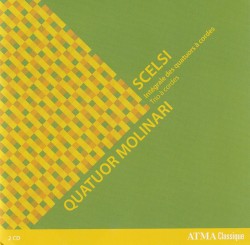 Scelsi – Integrals des quatuors a cordes; Trio a cordes
Scelsi – Integrals des quatuors a cordes; Trio a cordes
Quatuor Molinari
ATMA ACD2 2849 (atmaclassique.com/en/product/giacinto-scelsi-complete-string-quartets-and-string-trio)
Italian composer Giacinto Scelsi wrote some of the most sublime music of the past century. It’s also some of the most radical. He was notoriously secretive, even forbidding photos of himself. Yet these string quartets, which span a forty-year period, are so personal that heard together they reveal much about this remarkable composer whose musical language was transformed by a profound spiritual awakening.
This is the first complete recording of Scelsi’s five string quartets since the legendary Arditti Quartet’s from 1990. It’s a significant addition to the Montreal-based Molinari Quartet’s invaluable series of complete string quartets by key modern composers. The Molinari brings the precision and clarity required for the close listening Scelsi’s music demands, plus a contemplative soulfulness. ATMA’s stellar sound does the rest.
You can already hear Scelsi pushing boundaries in the post-Schoenbergian String Quartet No.1 from 1944 – the gong effects, the pitch-bending. But after a devastating mental breakdown he came to reject its engaging rhythms, intricate counterpoint, complex harmony and delightful thematic developments.
Immersing himself in theosophy and eastern religions, Scelsi spent months at the piano repeating one note over and over. He eventually switched to an Ondioline, an early electronic keyboard. It allowed him to explore the infinity of sounds contained in a single pitch through alterations like microtones, vibrato, glissandi and ostinato. The searing Trio from 1958 initiates his new language, a year before his acknowledged breakthrough work, Quattro Pezzi su una nota solo.
The more expansive Second Quartet followed two years later. There’s an especially thrilling passage which reveals the Molinari’s mastery of Scelsi’s strange and wonderful style when the heightened drama of the fourth movement resolves into the dreamy incantations of the last movement. He gave each of the five movements of the Third Quartet titles describing conflict, liberation and catharsis, though there’s more catharsis than conflict. In the more fraught Fourth Quartet the Molinari unfurls an enthralling sweep of colours and textures in a single movement.
The Fifth Quartet was Scelsi’s last major work. Distilled into seven transcendent minutes, it serves as a fitting memorial to this remarkable composer.



